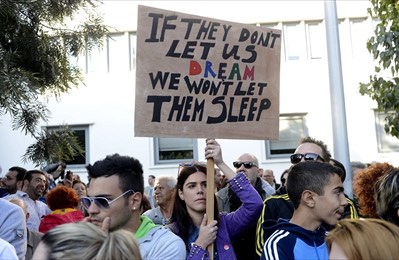 At the time of writing it is unclear how the Cyprus “bail-in” crisis will be resolved. Regardless of the ending it is clear that a modern Rubicon has been crossed. It has been a tenet of faith since the financial crisis exploded in 2007 that the money people have in banks, up to EUR100,000, is safe. Taxes may be raised, public sector jobs and salaries cut, public services reduced or sold off but banks can still be trusted to look after people’s’ money in their bank accounts. “Savers” are now “lenders to banks”.
At the time of writing it is unclear how the Cyprus “bail-in” crisis will be resolved. Regardless of the ending it is clear that a modern Rubicon has been crossed. It has been a tenet of faith since the financial crisis exploded in 2007 that the money people have in banks, up to EUR100,000, is safe. Taxes may be raised, public sector jobs and salaries cut, public services reduced or sold off but banks can still be trusted to look after people’s’ money in their bank accounts. “Savers” are now “lenders to banks”.
The initial terms of the Eurozone “solution” of Cyprus’ banking problem has blown that tenet apart. It seems that finance ministers, EC officials and the IMF have decided that bank accounts are no longer safe. Some are hastily backtracking once they see the public anger but too late: they did say “cross the Rubicon, it’s only a little stream in little Cyprus”. The details, still being debated whilst I write, are irrelevant.
The European Union prides itself on being a union of values. The claim is a fixture in many documents from all of the Brussels institutions: Parliament, Commission, Council (and the Bank in Frankfurt).
The initial terms of the Cyprus “deal” break a fundamental value: that of trust.
I think that the Cyprus “deal” is a watershed. Across the EU more and more people are becoming angrier, more cynical, and more distrustful of those in power. Dissent is moving from the fringe nearer the centre, the mainstream, perhaps not now but slowly and progressively.
One of the posters at a demonstration in Nicosia read “If you don’t let us dream, we won’t let you sleep“: the title of a recent play at the Royal Court Theatre in London. It marked a return to overt political theatre. The play may not have hit the heights of theatrical drama but the message and intent was clear. The cultural sector often claims for itself that it challenges the status quo, that it triggers a deeper look at our society and current beliefs. In reality the overwhelming output of the creative and cultural sector does nothing of the sort. But in times of crisis, when basic values are under threat, it is promising that some parts of the creative world can present a strong reflection. It is surely a time when culture, the arts, needs to challenge the economic basis of society, a return to collective values rather than the intensity of challenging individual identity.
There are calls for a new European Union. They vary from one based on a cultural concept, or led by and for citizens or a social Europe. They have in common a demand for a fundamental change in direction, a rejection of the pure market led society and ideology now prevalent.
Ken Loach’s film “Spirit of 45” records the transformation of British society after the Second World War; a social transformation slowly dismantled from Thatcher onwards and being rapidly dismantled by the current UK government in the name of austerity. It is not just in the UK.
The film highlights the poverty of the 1930s. There is a telling shot of a poster “Starving men fed daily”; the film ends with a queue at a food kitchen in Walthamstow in 2013. Recently the leading Labour Party politician charged with drafting the new party policy said that he believed food kitchens will remain with us, (and not just in the UK). Leadership? Progress? A warning?
2013 in the EU has been marked by a succession of comments, speeches and plans based around the false idea that the European Union welfare state concept, the social market, can no longer “compete” in the world increasingly dominated by Asian societies paying little attention to welfare of their citizens.
If there was a time for a cultural European Union, a citizens’ European Union, it is now. Both need to reject the current direction of politicians; it is not a time to tinkering at the edges or for confusing lobbying for more money for the arts with a need to change the ideological direction.
Photo from here
